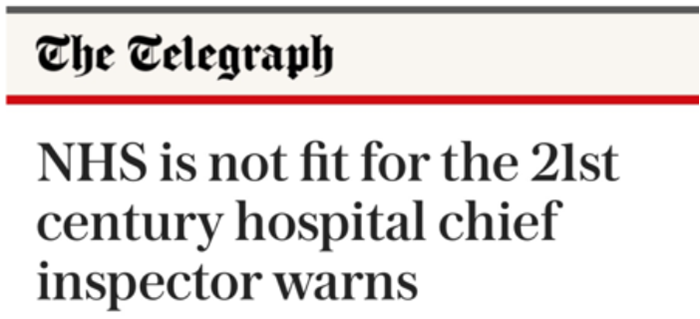Surfing my FB pages the other day I came across a link to a blog written by Dr Rachel Clarke, a Medical Writer, Feminist and Junior Hospital Doctor from Oxford. Rachel had written this in response to The Telegraph headline below. The story concerned Prof Ted Baker, Chief Inspector of Hospitals (http://www.telegraph.co.uk/news/2017/09/29/nhs-not-fit-21st-century-hospital-chief-inspector-warns/).

The blog is a passionate attack on a negative culture of blame but also raises the question of funding. I include one short section and thoroughly recommend reading it in full by visiting https://doctoroxford.com/2017/09/30/an-open-letter-to-prof-ted-baker-following-his-attack-on-the-nhs/
“Let me remind you what blame culture achieves, Professor Baker. First, it demoralises and undermines frontline staff. Then, it makes us feel hopeless and impotent. We stop trying to speak out, we become cowed and silent. And now, all that bullying and blame has managed to make the NHS less safe, not more, by allowing a culture to flourish in which no-one feels they can change anything, let alone risk speaking out for the sake of our patients.
In your interview, you’ve just achieved all of the above. I’m a hard-working NHS hospital doctor, and you’ve made me feel angry, demoralised, hopeless and incredulous – all in the same moment. That is not leadership, Professor Baker, and it is certainly not conducive to high standards of patient care. It serves only to present you to the public and NHS staff alike as a hospital chief inspector who seems to care more about playing a political game than the vital matter of patient safety.”
The statement that Professor Baker makes is true but not for the reasons he states. I completely agree with much of what Rachael says but she too, misses the point. And the point is that until and unless we decide what the point of the NHS is, then we are flying at night in a bucket of dirt. I could, I should expand but it is late and I have just finished my first ever appraisal (because I have been overseas for 17 years) in the process of revalidating and getting back into the NHS challenge. Some people do get it. There is an abundant amount of money to provide a service which promotes health, treats acute disease and manages to give comfort to those with chronic disease. But there are thousands if not millions who are not essential to this process and to remove them from the NHS would be a wonderful thing. But how do you do it? That needs to be thought through.
The sheer reckless waste of so many of the IT systems; we need ONE good one. The NHS is potentially creating an immense amount of data each minute of each hour of each day and we are not capturing it. Every blood test, every ECG, every vital sign, every histology - these should all be recorded on a database that can be structured to auto interrogate and build up our knowledge of health and disease. We are using so little imagination in our healthcare. We are so wasteful of opportunities. Healthcare should not be about politics. We are talking about human rights. We are talking about basic standards of acceptable care which is given to all people within the nation. And we will generously care for those who have acute and emergency problems no matter where they come from.
But make no mistake. We are not afraid to tackle very difficult issues and we should be the ones who are involved in the legislation of the debates over end of life issues; assisted suicide, euthanasia. We should be involved at looking at the effects of industry on the health of our nation and making appropriate responses.
Nutrition is a key element. We are biological entities after all and you just have to scale up the cell culture recipes and discipline to know what our biological needs are. What about alcohol? Tobacco? Road traffic accidents? And Type II diabetes. We can always find ways to source money. But the NHS needs to be slowly and delicately picked apart. We do need a National Health Service and we do not need these Trusts. We need the essential nodes to be integrated with massive savings in procurement and utilisation with national protocols and minimal acceptable standards of care. We need to carefully dissect out the parasites that lurk within the current NHS; quality control, service delivery, essentially managers of managers – we must release them as painlessly as possible.
There is tremendous redundancy in the NHS and we need to address that, here and now. It is not acceptable to allow things to fail and then let the private sector cherry pick the ensuing disaster. I could go on but there is no doubt that we need an NHS befitting of the 21st century. It needs to be a lot slimmer and sleeker than it is at present. And far more agile and reactive. We need to start thinking about what sort of NHS we want in the 21st Century. For certain, we do not want the NHS we currently endure.




